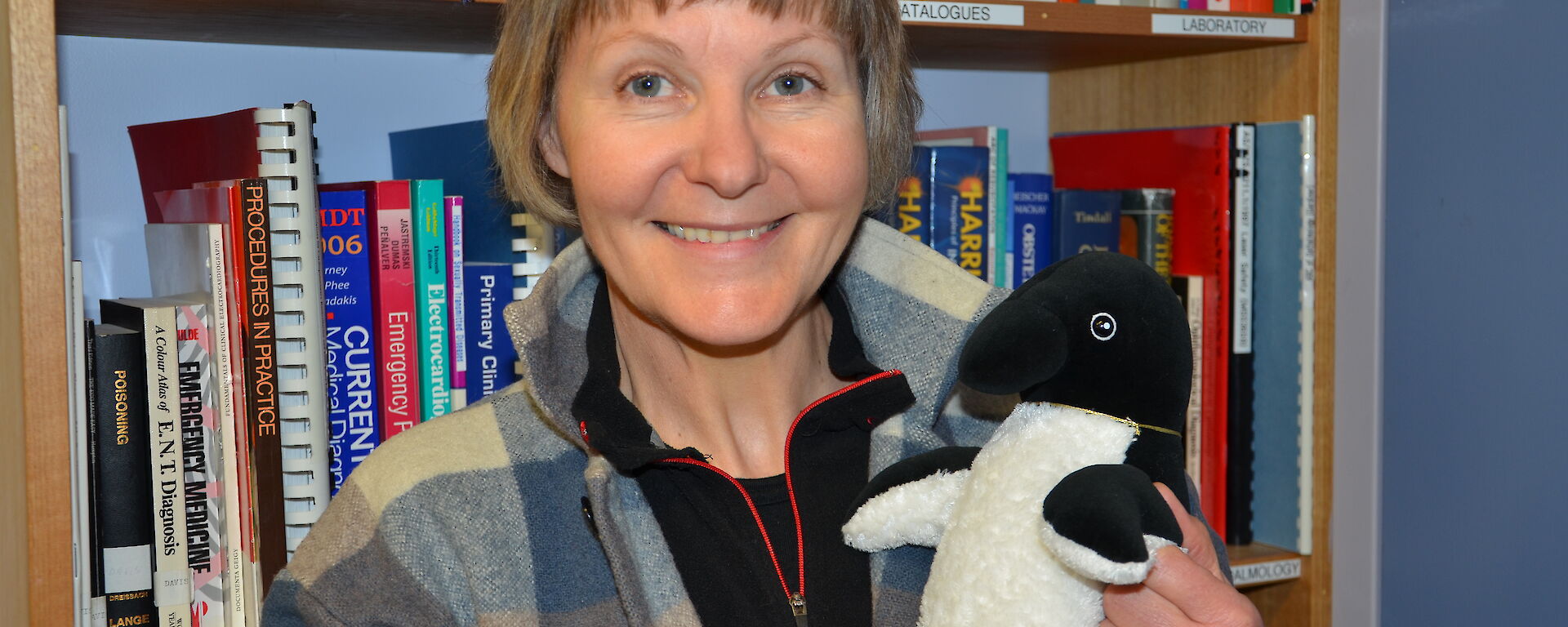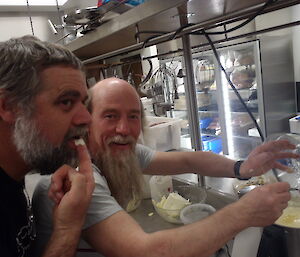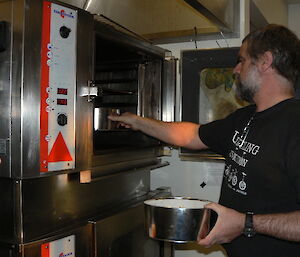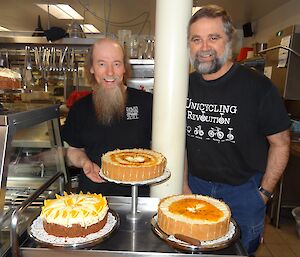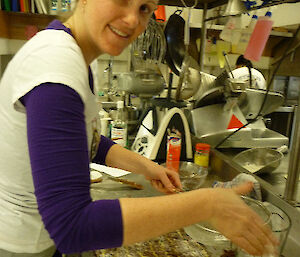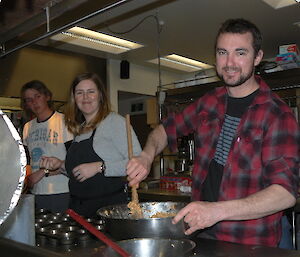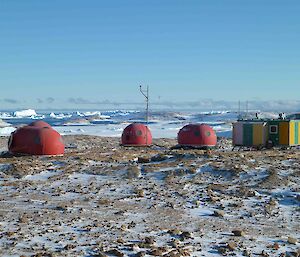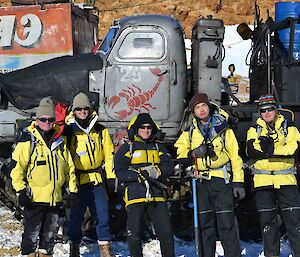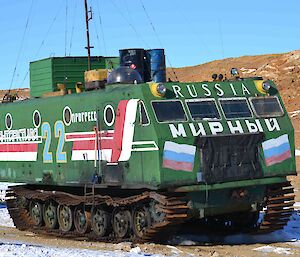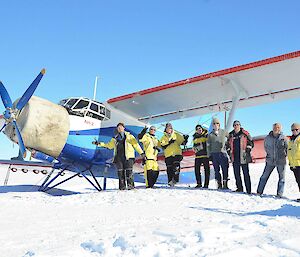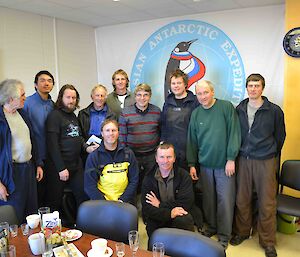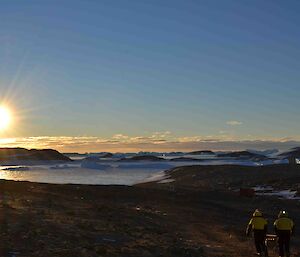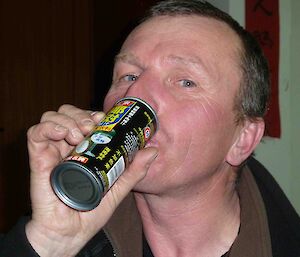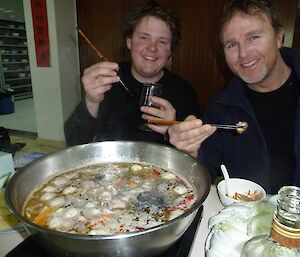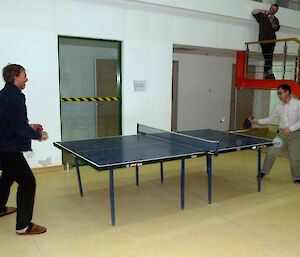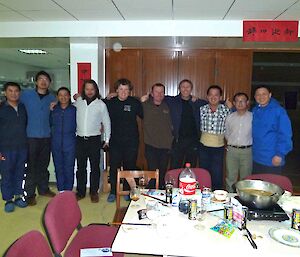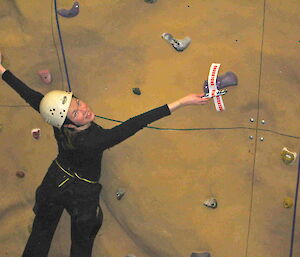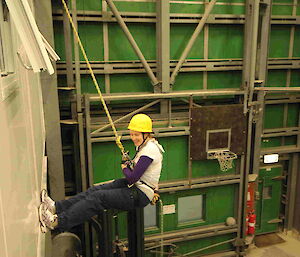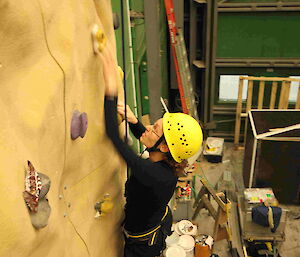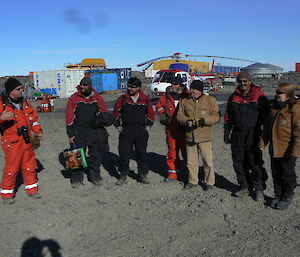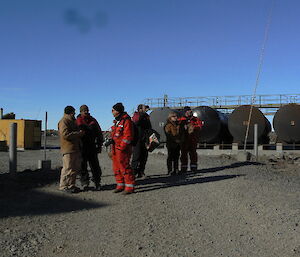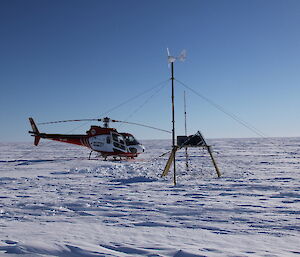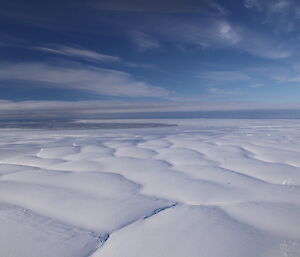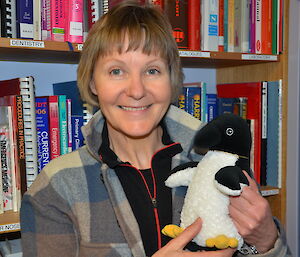By Lucas Koleits
Last weekend seven extremely fortunate expeditioners had the opportunity to visit the Russian and Chinese Antarctic stations in the Larsemann Hills. The Larsemann Hills are around 120km southwest of Davis station. They are home to the Indian base Bharati, the Chinese base Zhongshan, and the Russian bases Progress 1, 2 and 3. The lucky group included Nick Chang, Laser Physicist; Alex ‘Gator’ Leonard, Electrician; Dave ‘Crazy’ Tulloh, Atmospheric Sciences Electronics Engineer; Brent ‘Cowboy’ Dennett, Carpenter; Mike Grimmer, Field Training Officer; Frank ‘The Tank’ Herbold, Painter; and myself, Lucas Koleits, Marine Biologist.
After flying by helicopter over no less than 6 magnificent glaciers, we touched down at Law base, a camp of 2 ‘Apples’ and 2 ‘Melons’ (the red buildings pictured) and a hut with a stove and eating areas. Within minutes of our arrival, we had visitors from the Russian station, Progress 2. They spoke very little English, and we spoke no Russian, but they were eager to take photos of us and of the camp.
Law base is nestled within walking distance of the Chinese and Russian stations, so in the afternoon we explored towards the abandoned Russian station, Progress 1. We found some remarkable vehicles being stored there. They truly looked like something out of science fiction — each one resembling a Thunderbird or a vehicle from Star Wars more than anything else any of us had before seen in the Antarctic. We later learned that these vehicles were used the previous year to traverse from Progress base to the Russian base at Vostok. They had operational for at least 35 years in the Antarctic, and have an incredible fuel ‘efficiency’ of 50 metres to the litre. That’s no typo – It takes 20 litres for one of these beasts to travel 1 kilometre.
The same day we continued past Progress 1, up towards the plateau, as we had spotted what looked like a biplane from the helicopter on the way in. As we wandered past the occupied Russian station Progress 3, we spotted this magnificent biplane. As we approached, the two Russian pilots, Gregory and Alec, emerged from digging in the snow to greet us. Gregory and Alec spoke only small amounts of English yet with no delay they began to show us around the machine, allowing us to even have a look inside. Gregory told us that the plane was built in 1947, and inside you could still see all the cables used for moving the wing and tail flaps. While Gregory and Alec were showing us around, they kept mentioning a second plane, and motioned to a patch of snow behind the first plane. At first we thought we were a little lost in translation, but as Brent went to investigate, we discovered that there was indeed a second plane just over the snowdrift — the only reason we missed it being that it was upside down and almost completely buried in snow! On closer inspection, the buried plane was the same model as the working one, and did not appear to be very old — the paintwork was quite fresh. Gregory and Alec explained that the wind had blown the plane over and it was buried in a blizzard. They then went on to explain that the holes that they were digging were so they could secure a second biplane in the near future. As we said goodbye (“Nos vidanya”) we gave them some chocolate as a gift. We were sad to leave, but the day was getting late, and we needed to set up camp.
The next day we ventured to the Russian station in the early afternoon after being invited by two of our visitors the night before, Russian surveyors Dennis and Stephan. At lunch we enjoyed traditional Russian stew and meatballs, with a lovely dried fruit tea. After lunch we were taken around the station, looking at the met offices, gym, workshop, powerhouse, water treatment and other areas. As we moved through the station we slowly accumulated an entourage of curious Russians, who were all extremely friendly. After the tour we were invited into the office of the Station Leader, Victor. Victor did not speak any English, but the scientist Sacha, the glaciologist Sergei, Dennis, Stephan, and a couple of other locals were able to translate much of our English for us. We presented Victor with a couple of bottles of port, which puzzled him to begin with, but he still enjoyed in the end. In true Russian style, Vicktor responded by offering us some vodka. We sat for a couple of hours talking about our respective countries, families, and cultures. The Russians were clearly enjoying our company as much as we were enjoying theirs, but unfortunately we had already organized to visit the Chinese station for tea, and so we reluctantly left to return back to Law Base, to collect our gifts for the Chinese expeditioners.
Our main gift for the Chinese expeditioners was a crate of our homemade Davis station beer, which was not the lightest of gifts to carry. The Chinese station was about two and a half kilometers from Law Base, over some not-so gentle terrain. We took turns carrying the precious cargo, but it was slow going, and unfortunately we were a little late. The Chinese station leader, Dr. Han, greeted us with a warm smile and handshake. He led us into their mess, where they had set aside a table just for us, with a big pot of boiling water, surrounded by a smorgasbord of fresh vegetables, meat and seafood. Dr. Han and Mr. Mung had prepared a traditional Chinese hot pot for us, which is a meal often saved for special events in China. Nick, who speaks Mandarin very well, introduced each of our party to the rest of the station. The Chinese ship had already taken away all the summer crew at Zhongshan, so only 17 winterers remained there. The meal was very social as Dr. Han explained what all the ingredients were and how best to prepare them. He also generously supplied us with delicious rice wine. After an extremely enjoyable and filling meal, we were led around the station facilities. The Chinese station living quarters building is only two years old, and is a truly impressive building. They have a wonderful half size basketball court, complete with polished floorboards, as well as library, Internet room, offices, pool table, and of course, ping pong table. Brent, ever the diplomat, challenged Dr. Han to a game of ping-pong, in which he played well but suffered a gallant defeat. Australia fared not too much better when we had a quick shoot of basketball. Dr. Han generously offered us gifts of traditional Chinese spirits and ornate bookmarks, which we accepted enthusiastically. We then moved to the seminar room, where Nick gave a talk about his work at the Davis station LIDAR. He was expecting to do this talk in English, but was asked if he could do it in Mandarin instead at the last minute. Courageously, Nick forged on explaining difficult scientific terms in his second language. All the expeditioners clearly enjoyed the talk, and after further exchanges of photos and data, it was time to leave. It was quite late when we had finished at the station, so Dr. Han offered to drive us part of the way back to Law Base in one of their vehicles. It was a fantastic way to end a very enlightening, eye-opening day.
The next day we were picked up by helicopter, keenly looking forward to telling everyone back at Davis the things we experienced at the Russian and Chinese stations. The one thing that stands out most for me personally is the hospitality of both stations. I’m truly impressed at how comfortable and welcome I felt at both places, and how relaxing the atmosphere was. We were not a diplomatic delegation that needed to be handled officially, rather we were simply groups of people that enjoyed each others company and learned a great deal about each other. I only hope that we can one day return the favour, and invite groups to Davis for a similar experience.
We would all like to thank the crew at Progress 2 and 3, Vicktor the station leader for his hospitality, and especially Dennis and Stephan, who invited us and were our wonderful guides. Also we would like to thank Dr. Han, and to the wintering crew at Zhongshan for all they did to make us feel comfortable. And finally, a big thank you to Alison Dean (our station leader here at Davis) for giving us this once in a lifetime opportunity, and to our ever dedicated trip leader, Frank ‘the Tank’ Herbold, who worked tirelessly to make this trip happen.

